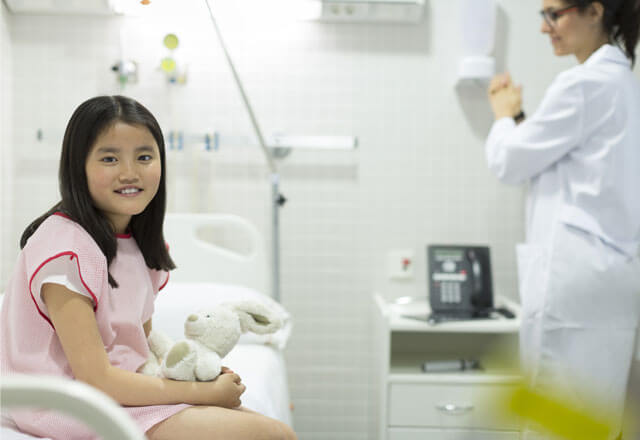Hand Hygiene Compliance
Good hand hygiene – washing hands or using a hand sanitizing gel – is the best way to prevent the spread of germs. Health care workers should wash their hands before and after caring for each patient. Patients, families, and visitors should also practice good hand hygiene.
What is this measure?

Hand hygiene is a key priority at Johns Hopkins Medicine. Hand hygiene means cleaning your hands by either washing them with soap and water or by using a hand sanitizing gel. Hand hygiene is a simple yet effective way to prevent infections.
Experts in the field of preventing infections work with our health care providers, patients, and families to make sure that they always keep their hands clean. This helps prevent the spread of viruses and bacteria that cause colds, flu and other infections.
At Johns Hopkins Medicine, certain employees are trained to watch how well medical staff keep their hands clean. They observe doctors, nurses and other health care workers to see if they wash their hands or use antibacterial gel before entering or leaving a patient’s room.
Johns Hopkins Medicine takes hand hygiene very seriously. More than 65,000 hand hygiene observations are monitored each year. This information is shared with hospital staff and leadership. The information is used to help continually improve hand hygiene in our health system so that we can provide the safest and best care to all of our patients.
Why is it important?
According to The Centers for Disease Control and Prevention (CDC), washing hands is one of the most effective ways to prevent the spread of diseases and infections. Germs can live on surfaces for hours and are often passed from person to person through physical contact.
Health care workers come in contact with patients, equipment, and other items in patient rooms. In the hospital, there are many opportunities for hand hygiene to help keep our patients safe. Ensuring doctors, nurses, and other staff have clean hands is critical to prevent the spread of illness.
According to The Joint Commission, a health care accreditation organization, direct observation of staff hand hygiene is the most effective and accurate way to measure hand hygiene compliance.
What is Johns Hopkins doing to improve?
Johns Hopkins Medicine strives for 100 percent hand hygiene compliance for all health care workers.
Awareness and Education Campaigns
Regardless of job role, every employee of Johns Hopkins Medicine must practice good hand hygiene to protect our patients, visitors, colleagues, and friends.
Posters and signs are placed around the hospital as reminders for health care workers, patients, and visitors to wash their hands or use a sanitizing gel. Staff and patients are also encouraged to speak up if they notice someone forgot to wash their hands.
Johns Hopkins Medicine also educates staff who may not have direct patient contact, but still play a vital role in infection prevention through good hand hygiene.
Keeping Staff Accountable
We continually use signs and education to remind staff of the importance of hand hygiene. All staff are encouraged to speak up if they see someone who has forgotten to wash their hands.
Every Johns Hopkins Medicine hospital also has employee recognition programs for staff members and units excelling at consistently practicing good hand hygiene. Many of our facilities also have programs and resources in place for direct feedback and coaching for staff members who were observed forgetting to perform hand hygiene.
Frontline Perspective
 Clinical manager Radek Hoffmann's team cares for up to 50,000 patients a year in the Pediatric Emergency Center.
Clinical manager Radek Hoffmann's team cares for up to 50,000 patients a year in the Pediatric Emergency Center.Radek Hoffmann R.N., B.S.N., C.P.E.N.
Clinical Manager, Emergency Center
Johns Hopkins All Children's Hospital
“Practicing good hand hygiene is important because it's the first step in preventing the transmission of germs. It's such a simple thing to do that is so beneficial to the well-being of our patients. We work every day to make it a standard in our daily practice.
“I work in the emergency room, where our team oversees hand hygiene practices. We have sinks and soap dispensers in every room. We also made sure that alcohol-based hand foam is prominently placed directly inside and outside every patient room so that all care providers are reminded to use it between seeing patients.
“We observe our team members' hand hygiene habits on a daily basis and hold each other accountable to protect our patients, their families and ourselves. I encourage all our staff members to speak up if they see something that could directly impact patient care. All staff should feel empowered to communicate and provide constructive feedback to each other to make our emergency room as safe as possible for our patients.
“Supporting our patients and their family members during a very stressful time is why I'm passionate about providing care in the emergency room. I want to make sure we deliver high-quality, safe care to our patients, and I am continually reviewing what opportunities we have to improve our hand hygiene compliance rates.”
How can patients and family support safety?
Patients and families are encouraged to speak up and ask health care providers if they washed their hands prior to entering the patient room.
Patients and visitors should wash their own hands often, including before eating, after using the restroom, and after touching any surface in the hospital room. Patients and visitors should encourage those around them to do the same. Visitors should also follow any additional infection control measures put in place by the health care team, such as wearing an isolation gown.
Communicating Clearly with Your Health Care Team
Hospital stays and medical treatments can be stressful for young patients and families. Communication can be challenging, and it may be difficult to know what questions to ask your health care team. Many resources are available to empower patients to effectively communicate questions and concerns with their doctors, leading to better, safer health care.
Additional Resources
Quality and Safety Performance During COVID-19
The organization’s quality and safety performance may have been impacted by the COVID-19 pandemic. We would urge patients to consider more recent performance in combination with historical performance. Patients may benefit from discussing with their healthcare provider the disruptions COVID-19 may have caused on quality and safety of care.
See how Johns Hopkins Medicine prioritizes safety during the COVID-19 pandemic.
